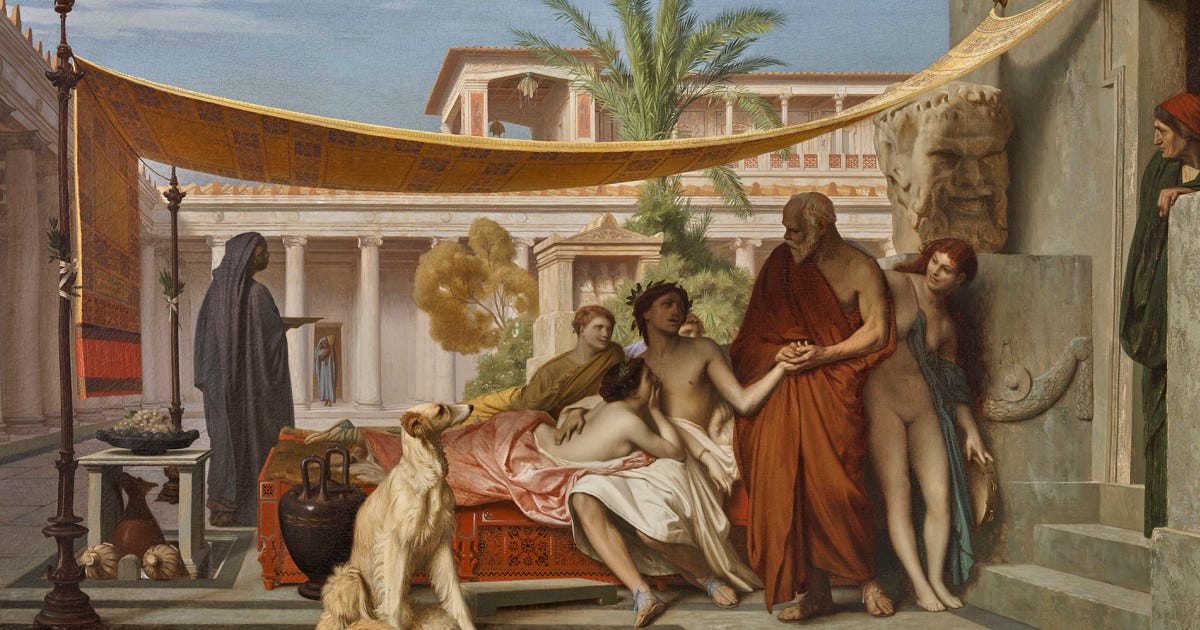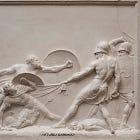“The safest general characterization of the European philosophical tradition is that it consists of a series of footnotes to Plato.”
— Alfred North Whitehead, Process and Reality, Part II, Chapter 1
Plato thought it no slight to put his greatest wisdom into fantasy.
He was a playwright as a young man, and though he burned his plays after finding Socrates and his philosiphia — his love of wisdom — Plato brought the playwright’s touch to the philosopher’s craft.
His goal was admirable: luring average Athenians into a higher moral and intellectual plane. Today, we’re those Athenians. His dialogues are for us.
Plato knew he couldn’t draw us in with technical philosophical jargon. He couldn’t do it with boring exposition. So he put his wisdom and the arguments hurled against it into the mouths of characters and had them do battle on the page. Arguably, no one’s done philosophical dialogue better.
So today I’d like to argue that we should all being spending some time with Plato.
What Belongs to Plato?
Plato’s greatest character is his old mentor, Socrates, written as an amalgam of a real person with ideas of his own and whatever thoughts Plato wanted him to parrot. The ratio in different dialogues is disputed by scholars, but dialogues by Socrates’s other student, Xenophon, also survive. The overlap between these two portrayals points us to Socrates’ probable beliefs.
Socrates probably spoke about these things in real life:
A need for skepticism about what we can know.
The “Socratic Method,” or elenchus, a powerful tool to expose contradictions between a person’s beliefs. But elenchus only points out contradictions without enshrining truths.
The idea that an unexamined life is not worth living.
The highest priority should be cultivating ourselves through virtue, not seeking wealth, power, or prestige.
Belief in a spirit-like daimon that warns him against certain actions. Notably, Plato doesn’t integrate this daimon into his own metaphysics.
And everything else?
Questionable. It’s either Platonic or unknowable.
Yet I suspect Plato wouldn’t make Socrates say anything that would have disgusted his mentor, even if he’d be skeptical of it. Plato clearly loved the old man, learned a lot from him, and was bereft when the citizens of Athens unjustly forced Socrates to commit suicide by hemlock.
“…he was like a father of whom we were being bereaved, and we were about to pass the rest of our lives as orphans.” — Plato, Phaedo, 116-118
Although Socrates’s incessant questioning and skepticism toward democracy angered many Athenians, he was clearly well-loved by those who knew him. Probably because he wasn’t just a thinker, but a great man, a friend to many, and a devoted servant of the state.
Well into middle age, Socrates deployed with the Athenian army and fought hard. He famously saved the lives of Alcibiades, his erstwhile student, and the generals Xenophon (another student) and Laches.
Although his city was uncomfortable with him, Socrates was unswervingly loyal to it. I discussed how he held the treacherous middle ground here:
Plato’s Legacy:
Socrates’s execution embittered Plato against the injustice of the mob and mass rule by fools, and drove him into numerous philosophical projects. His “high-level” philosophy writings didn’t survive. His attempts to install a philosopher king abroad went nowhere. But his dialogues — his outreach to the masses — became incredibly popular and changed the course of history.
For centuries, they’ve been a slap across the face for average people who didn’t suspect they’d dropped the ball. Many have been spurred to new heights.
The Stoics considered their philosophy a branch of Socratic philosophy, an attempt to systematize and flesh out Socrates’ ideas. Stoic ideas, in turn, ended up in our most popular psychological therapies, such as Cognitive Behavioral Therapy. You can find some of Plato’s ideas reflected in the US Constitution, our education systems, law courts, and even in myth and fiction.
The founders of recent ethical/philosophical frameworks like utilitarianism, deontology, and existentialism were all classically trained and often reacted against and wrestled with Plato. None of their systems definitively “defeated” Plato’s ideas, and they have their own flaws.
And of course, if Socrates was the champion for Plato’s ideas “on stage”, he needed “spear carriers,” and antagonists to flesh things out. Most major and minor roles in the dialogues were real people. Some have surviving work we can look at, and it seems like Plato honestly represented their ideas (Here’s looking at you, Gorgias!")
But even if some or all of the dialogues happened in some form, we shouldn’t assume their word-for-word truth. Plato was clearly manipulating the discussions and leading the interlocutors — and his readers — towards certain conclusions.
Is Plato Still Worth Our Time? Isn’t He Outdated?
Plato accurately represented the philosophical struggle towards truth, and the frustrations that arise from it. He doesn’t just explain conclusions as many modern philosophers do. He expects you to find your own truth through struggle, not indoctrination.
Plato has Socrates use simple questions to strip the facade of reason from society’s beliefs; it turns out that “commonsense” ideas often don’t hold up when tested.
Characters struggling with Socrates’s questions often end up in “aporia,” a state of puzzlement where they can’t defend their old beliefs, but haven’t quite signed on to Socrates’s either.
Why else?
Plato’s ideas are timeless because human nature hasn’t changed.
Socrates and his interlocutors clash over communism, feminism, birth-control, nihilism, eugenics, socialism, and dozens of other topics you thought were modern, but are actually ancient.
In an age of algorithms and fragmented attention spans, Plato helps us retrain deep focus and long-form thinking.
The dialogues are intellectually interesting, but they’re really about our inner life and what kind of a person we should try to be. He’s trying to hand us a non-dogmatic moral compass.
We thought we’d moved beyond the conflict between democracy, aristocracy, oligarchy, tyranny, and monarchy, but the last decade has seen democracy faltering across the Western world. The dialogues help us think through the options.
Plato has ideas he thinks are true, but he’s more interested in teaching us how to think than what to think.
Where To Start With Plato:
There’s no perfect entry point to Plato, but a great option is his dialogue Gorgias, and it just so happens that we’re doing a read-along of it this month on Socratic State of Mind. Please consider joining us:
Thanks for reading Socratic State of Mind.
If you liked this article, please like and share it, which helps more readers find my work.





Plato was certainly highly influential but in a bad way. Most of the good stuff in Plato seems to come from Socrates. Plato gave us a philosophy divorced from physical reality and in which the real world is a mere inferior reflection. I much prefer Aristotle.